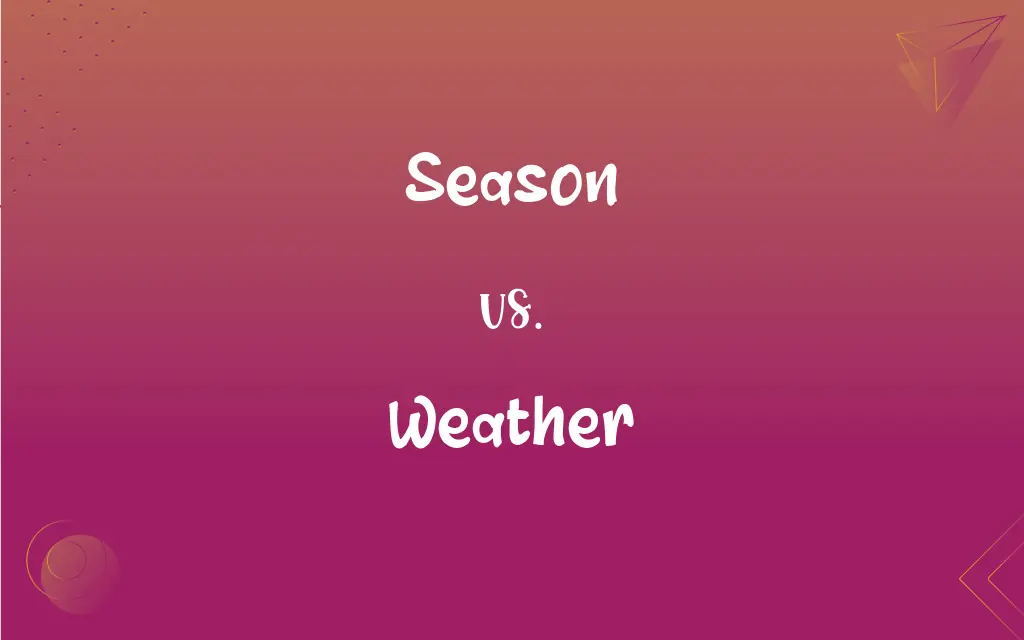Season vs. Weather: What's the Difference?
Edited by Janet White || By Harlon Moss || Updated on October 25, 2023
A season is a period of the year characterized by specific weather conditions, while weather refers to the atmospheric conditions at a specific time and place.

Key Differences
A season represents a recurring period in a year, defined by consistent weather patterns, daylight duration, and temperature ranges. Weather, in contrast, describes the current atmospheric conditions, including temperature, humidity, precipitation, and wind, at a given moment or short period.
The change of seasons results from the tilt of the Earth's axis and its orbit around the Sun. This tilt causes varying amounts of sunlight to reach different parts of the Earth at different times of the year. On the other hand, weather changes can occur daily or even hourly, influenced by numerous factors such as air pressure, ocean currents, and topography.
There are typically four seasons in temperate regions: spring, summer, autumn (or fall), and winter, each with its own general weather patterns. However, weather can vary widely within a season. For instance, a summer day can be cool and rainy or hot and dry.
Seasons provide a general framework for predicting the kind of weather a region might experience. For instance, winter usually brings colder temperatures and possibly snow in temperate regions. Weather forecasts, meanwhile, offer specific, short-term predictions, informing individuals about immediate conditions like the chance of rain or snow, temperature highs and lows, and wind speeds.
In some parts of the world, the distinction between seasons isn't as pronounced. Yet, weather changes can still be dramatic and swift. For instance, tropical regions might experience a wet and a dry season, but weather within those seasons can be unpredictable, with sudden downpours or clear skies.
ADVERTISEMENT
Comparison Chart
Duration
Longer periods (e.g., months)
Short term (e.g., daily or hourly)
Predictability
Predictable based on Earth's position relative to the Sun
Can change rapidly and is influenced by many factors
Variation
Typically four in temperate regions
Can vary multiple times in a day
Cause
Result of Earth's tilt and orbit
Influenced by air pressure, topography, etc.
Description
General (e.g., warm summer or cold winter)
Specific (e.g., 75°F with a chance of rain)
ADVERTISEMENT
Season and Weather Definitions
Season
A season can be one of the four main divisions of the year.
Winter is the coldest season, usually characterized by snow in many regions.
Weather
Weather can change frequently within short periods.
The weather was sunny in the morning but turned stormy by afternoon.
Season
A season marks a specific segment of the annual cycle.
During the rainy season, the countryside becomes lush and green.
Weather
Weather encompasses factors like temperature, humidity, and precipitation.
The weather forecast predicts rain for the entire week.
Season
A season is often determined by the Earth's position relative to the Sun.
As the Earth orbits the Sun, the change in its tilt brings about different seasons.
Weather
Weather provides detailed information about immediate atmospheric conditions.
The cold weather today reminds me to wear my coat.
Season
A season is a distinct period of the year with particular weather conditions.
My favorite season is fall because of the colorful leaves.
Weather
Weather describes the atmospheric conditions at a specific time.
The weather today is sunny with a high of 85°F.
Season
A season provides a general expectation of weather patterns.
The hurricane season is when tropical storms are most likely to occur.
Weather
Weather can be influenced by various factors, including geographic location and elevation.
The mountainous region experiences cooler weather compared to the plains.
Season
One of the four natural divisions of the year, spring, summer, fall, and winter, in the North and South Temperate zones. Each season, beginning astronomically at an equinox or solstice, is characterized by specific meteorological or climatic conditions.
Weather
The state of the atmosphere at a given time and place, with respect to variables such as temperature, moisture, wind velocity, and barometric pressure.
FAQs
How is weather different from climate?
Weather describes short-term atmospheric conditions, while climate refers to long-term average conditions.
Can weather conditions differ within a season?
Yes, weather can vary widely within a season, with variations in temperature, precipitation, and more.
What causes the change in seasons?
Seasons change due to the Earth's tilt and its orbit around the Sun.
Which season is typically the warmest?
Summer is usually the warmest season.
Can man-made activities influence weather?
Yes, activities like deforestation and pollution can impact local weather patterns.
How do animals adapt to changing seasons?
Animals might migrate, hibernate, or change behaviors based on seasons.
How many seasons are there in a year?
Typically, there are four seasons: spring, summer, fall, and winter.
Why are seasons reversed in the Southern Hemisphere?
The tilt of the Earth causes the Southern Hemisphere to face the Sun during different months than the Northern Hemisphere.
What factors influence daily weather?
Weather is influenced by air pressure, humidity, temperature, wind patterns, and more.
Can a place experience more than one season in a day?
While a place has one season at a time, rapid weather changes can make it feel like multiple seasons in a day.
How accurate are weather forecasts?
Modern forecasts are generally accurate for short-term predictions, but accuracy diminishes for longer periods.
How do seasons and weather affect fashion?
Fashion trends often align with seasons, with clothing suited for the expected weather.
Why do some places have more pronounced seasons?
Proximity to the equator, altitude, and ocean currents can influence the intensity of seasonal changes.
How can weather impact daily activities?
Weather can affect transportation, outdoor events, health conditions, and more.
Do seasons affect human behavior?
Yes, seasons can influence mood, activity levels, and social behaviors.
Is daylight duration affected by seasons?
Yes, days are longer in summer and shorter in winter due to the Earth's tilt.
Can technological advancements predict season and weather changes more accurately?
With advancements in technology, forecasting methods for both seasons and weather have improved over time.
How do seasons affect agriculture?
Different crops are planted and harvested in different seasons based on weather conditions.
Can extreme weather events occur outside their typical season?
Yes, weather can be unpredictable, and extreme events can sometimes occur outside their expected seasons.
Are there places with only one season?
Some tropical regions experience minimal seasonal variation, often having just wet and dry seasons.
About Author
Written by
Harlon MossHarlon is a seasoned quality moderator and accomplished content writer for Difference Wiki. An alumnus of the prestigious University of California, he earned his degree in Computer Science. Leveraging his academic background, Harlon brings a meticulous and informed perspective to his work, ensuring content accuracy and excellence.
Edited by
Janet WhiteJanet White has been an esteemed writer and blogger for Difference Wiki. Holding a Master's degree in Science and Medical Journalism from the prestigious Boston University, she has consistently demonstrated her expertise and passion for her field. When she's not immersed in her work, Janet relishes her time exercising, delving into a good book, and cherishing moments with friends and family.































































